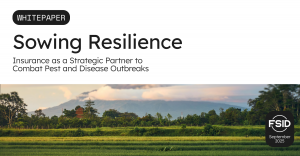FSID launches whitepaper exploring how insurance can act as a strategic partner for combating pest and disease outbreaks
Global food demand is projected to increase by approximately 35-56% by 2050, driven in large part by increasing population and diet trends in the developing world.”
LONDON, UNITED KINGDOM, September 25, 2025 /EINPresswire.com/ -- FSID (Food Systems Innovation & Delivery), a UK-based agri-tech start-up focused on forecasting, predicting, and managing pest and disease impacts on crops, has today announced the release of its latest whitepaper, Sowing Resilience – Insurance as a Strategic Partner to Combat Pest and Disease Outbreaks.— - David Godding
Globally, up to 40% of agricultural crops are lost to pests and diseases each year. Despite this, insurance products designed to cover these risks remain under-represented and underutilised.
FSID’s new whitepaper explores how insurance can act as a powerful tool to protect farmers, businesses, and food systems from the economic and social shocks caused by agricultural outbreaks.
When crops go uninsured, the consequences ripple far beyond the farm. Smallholders risk losing their livelihoods overnight, while large farms face catastrophic financial shocks that can destabilise entire supply chains. Pest and disease outbreaks are among the leading drivers of these losses, as we’ve seen in cocoa, where prices have spiked more than 400%, a risk that reverberates across global trade and economic stability. - Seb Worthington, Co-Founder of FSID, on the global economic repercussions of uninsured crops.
While drought insurance has dominated the market to date, pest and disease risks are a major threat to production. FSID highlights that around 60% of insurable crop production remains uninsured, particularly across the Global South, where the impacts of outbreaks can cascade into lost income, reduced investment, and food insecurity.
The report also examines how advances in remote sensing, epidemic modelling, and AI-powered diagnostics can help overcome longstanding challenges in agricultural insurance, such as basis risk, moral hazard, and limited claims data; showcasing how new hybrid insurance models – combining remote detection with on-the-ground validation – can support both prevention and response to pest and disease outbreaks at scale.
Global food demand is projected to increase by approximately 35-56% by 2050, driven in large part by increasing population and diet trends in the developing world. In these same regions, pest and disease outbreaks are often most severe, and climate change further destabilises food systems. We urgently need comprehensive resilience mechanisms, like insurance, not just covering weather based threats, but also providing comprehensive cover for the often neglected risks posed by pest and disease outbreaks. - David Godding, CEO of FSID, on the importance of pest and disease insurance
Evidence from countries such as China shows that the adoption of pest and disease insurance can improve farmer incomes and encourage investment in better farming practices. FSID’s analysis suggests that insurance should be seen not only as a financial safety net but as a strategic partner in building resilience to future agricultural shocks.
The whitepaper is available for download now via FSID’s website
Luke Donovan-King
Forge Together Ltd
+44 7753 228375
email us here
Visit us on social media:
LinkedIn
Legal Disclaimer:
EIN Presswire provides this news content "as is" without warranty of any kind. We do not accept any responsibility or liability for the accuracy, content, images, videos, licenses, completeness, legality, or reliability of the information contained in this article. If you have any complaints or copyright issues related to this article, kindly contact the author above.

